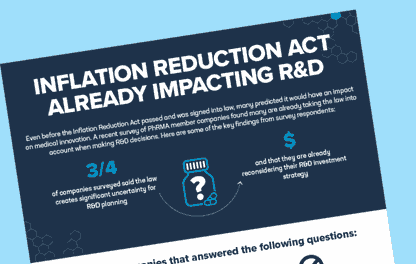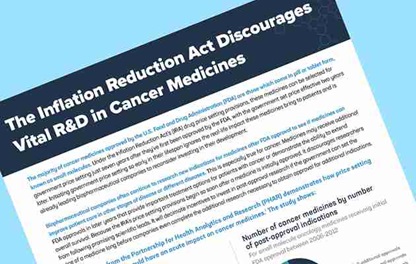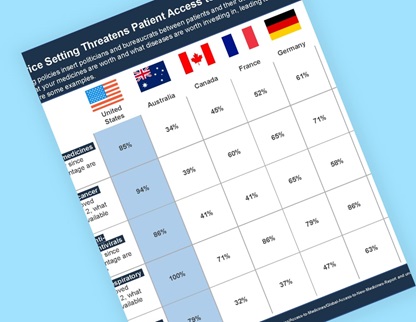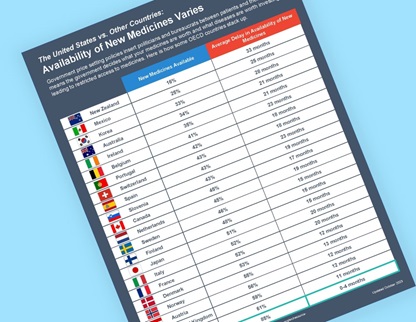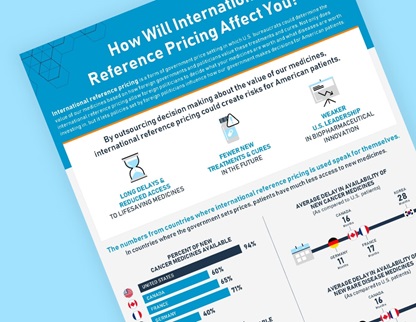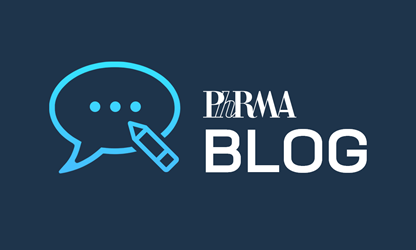Medicare “Negotiation”

Signed into law in 2022, the Inflation Reduction Act put in place policies that mandate government-set prices for medicines covered by Medicare. These polices are expected to have a negative impact on access to medicines covered by Medicare Part B and Part D, in addition to discouraging continued drug development. The process starts seven years after small molecule medicines (e.g., tablets, capsules and pills) are initially approved by the U.S. Food and Drug Administration (FDA) and 11 years after large molecule medicines (e.g., biologics that are injected or infused) are initially approved by the FDA. This system ignores the nature of the research and development (R&D) process, discouraging continued R&D after a medicine is FDA approved and deeming some types of medicines as not worth the real-life impact they can have on patients. This process also ignores how therapeutic value increases over time as medicines are approved for new uses, such as in new patient populations, new diseases or new stages of disease.
Prescription Drug Boards

Prescription drug boards give bureaucrats the power to arbitrarily set medicine prices in a given state. As a result, decisions about medicines would be a part of a political process that changes with elections and the whims of politicians.
Under this policy, the state would evaluate whether certain medicines and treatments are “worth” paying for, meaning the state’s bureaucracy could come between patients and the treatments their doctors prescribe. This spells disaster for patients as they could face barriers to obtaining lifesaving medications.
Instead of pushing for additional government price-setting policies like prescription drug boards that assign bureaucrats the power to arbitrarily set medication prices, state leaders have the chance to fix a broken health care insurance system without sacrificing access, innovation and jobs.
Patients need help affording their medicines at the pharmacy counter, which is why we have consistently supported numerous policies that will directly address this need. Unfortunately, there’s no evidence the prescription board will solve these problems.
Government price setting threatens families’ access to the medicine they need

Ensuring A Better Future For Her Child: Emily H
Caring for a child with a serious illness isn’t easy. "It took us a long time to get answers for him—9 years. And it took going across the country to a specialty clinic." Now Emily is raising her voice to ensure that her son and kids across the country have access to the medicines and new innovation they need.

Patients Like Olga Worry Congress Might Compromise Access to Medicines by Meddling with Medicare
Olga is a senior who feels blessed to have gotten the Covid-19 vaccine. But she is worried now that Congress might meddle with her Medicare and make changes that threaten her access to medicines.

Patients Like Sue Worry Congress is Compromising Access to Medicines by Meddling with Medicare
Sue is a patient with Type 1 diabetes who depends on Medicare to get her medicines. It’s not always easy. Now some in Congress want to make it harder for patients like Sue to access her medicines. There’s a better way to fix health care for patients.
Reference Pricing

Some government price-setting proposals would allow the government to set prices based on those paid by foreign governments (also known as “foreign reference pricing”). This approach sets us down the path where the government may determine which medicines are worth providing access to and which are not based on the decisions of the referenced foreign governments—regardless of what patients and their doctors think. Other proposed approaches would implement “domestic reference pricing,” which could allow the government to set a maximum price for medicines using an average domestic price and then potentially request deeper discounts from manufacturers based on other determinations of the clinical benefit or value of a medicine. Whether through foreign or domestic reference pricing, patient access to current and future medicines is put at risk.


